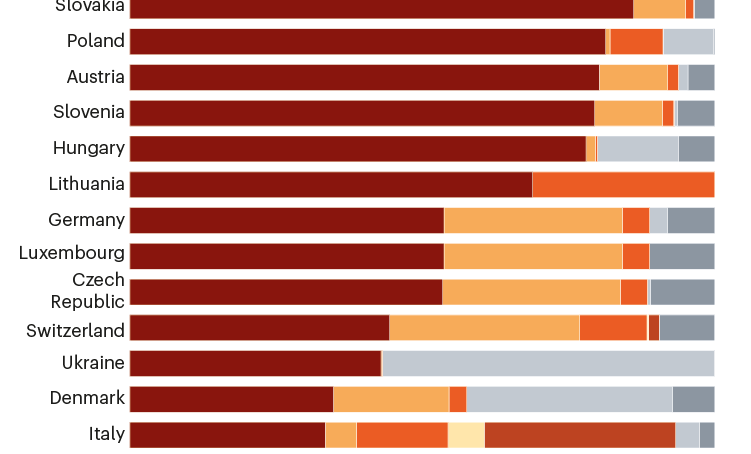
A report last month by Leopoldina, the German National Academy of Sciences, found that Germany could survive the next winter without Russian energy, but only with extreme efforts to replace Russian gas with imports while ramping up coal-fired power plants and promoting largescale conservation and energy efficiency.
It also depends on higher prices causing a slowdown in heavy industry in the country.
Although the next few years could be tough, the long-term impact on energy policy and greenhouse-gas emissions in Europe could be beneficial, according to Grimm, a co-author of the Leopoldina report. The power sector is covered by the European trading system, which caps cumulative carbon emissions, so a temporary increase in coal power, for instance, should drive up the price of carbon credits and force emissions reductions elsewhere.
In the longer term, Veronika Grimm, an economist at the Friedrich Alexander University of Erlangen-Nuremberg in Erlangen, Germany, says the German government is proposing to increase the share of renewable energy sources in the power sector from around 40 per cent today to 100 per cent by 2035, five years earlier than planned. “That’s quite ambitious,” Grimm says.
A sustained period of high energy prices could also drive significant investments in energy efficiency, an area that has enormous potential but has attracted less attention than renewables. “This will speed up a lot of work that we needed to do anyway.”
The energy picture is less clear at the global level. When prices for oil and gas have surged in the past, it has spurred a series of changes in opposite directions: consumers tended to drive vehicles less and purchase more fuel-efficient versions, whereas companies and nations invested in oil and gas infrastructure around the globe to ramp up production. But the current crisis might not trigger the same response.
On the consumer side, growing gaps between the richest and poorest people in many countries are changing patterns of car buying. Although consumption is likely to drop in the short term as drivers respond to rising prices, that doesn’t mean we should expect a massive shift towards smaller or electric vehicles, says John DeCicco, an engineer at the University of Michigan in Ann Arbor who tracks the vehicle industry.
That’s because the people who tend to buy new vehicles are wealthier than they were in decades past, meaning they won’t react to the economic pressure of higher petrol prices as much as before.
“Compared to previous oil shocks,” DeCicco says, “this is a different world.”
By contrast, economists have yet to see major oil and gas companies ramp up their investments in fossil-fuel production. Global leaders have been emphasising the need for decarbonisation in the past few years, and companies are now more wary of sinking their own capital into assets that could be stranded as climate policies are ratcheted up in the future, says Ricardo Hausmann, an economist at Harvard University in Cambridge, Massachusetts.
“The market is scared,” Hausmann says, but so far, global supply and demand haven’t changed much – a dynamic that could change if prices remain high for a sustained period.
Although the war in Ukraine will probably speed up Europe’s move away from fossil fuels, it could slow the clean energy transition – and boost greenhouse-gas emissions – in other parts of the world, fears Nikos Tsafos, who tracks global energy and geopolitics at the Centre for Strategic and International Studies, a think tank in Washington DC.
Southeast Asia, in particular, could turn back towards coal if Europe effectively corners the international market for liquefied natural gas, according to Tsafos. And then there’s Russia itself, which accounted for nearly five per cent of global emissions in 2020 and is unlikely to move forward with decarbonization in the absence of international political and economic engagement.
Another key question, some economists say, is how rising energy prices and the potential loss of grain supplies from Ukraine and Russia could reinforce inflationary effects and drive-up prices for food and other commodities.
“The potential reverberations on food prices and therefore on conflict and politics around the world are vast,” says Nathaniel Keohane, president of the Centre for Climate and Energy Solutions, an environmental think tank in Arlington, Virginia.
In the short term, prices have increased owing to hoarding and bidding wars. But global food stocks are sufficient to cover the loss of wheat and other grains from Ukraine as a result of the war itself, and losses from Russia owing to economic sanctions, says Christopher Barrett, an economist at Cornell University in Ithaca, New York.
There could be disruptions to fertilizer markets because fossil fuels are a major feed stock, but Barrett says farmers around the world should be able to negotiate these changes by using substitutes.
Still, the cost of rising petrol and electricity prices to the larger food-supply system could be substantial, says Barrett.
“One of the big casualties of the Russian invasion will be people who are already teetering on the edge in other places,” he says. “It’s not just Ukrainians. It’s Yemenis, and Syrians and Nigerians.”
- A Nature report











